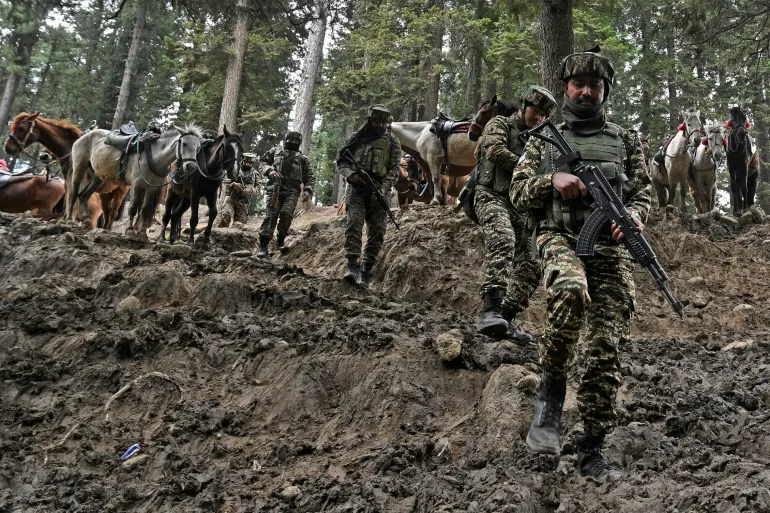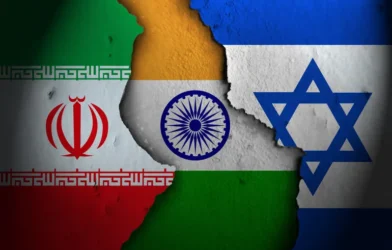Subtotal $0.00
experienced Kashmir In one of the deadliest militant attacks in years, 26 Indian tourists were killed and others injured in an attack claimed by the Lashkar-e-Taiba-linked Resistance Front in Pahalgam district on April 22, bringing to mind scenes of escalation that India andPakistan Always on the brink of war, most recently in 2019.
The Indian government immediately and predictably accused Pakistan of being behind the attack and announced a series of escalatory measures, including the suspension of the diplomatic Indus River water-sharing treaty, the closure of the main land border crossing at the Atari-Wagha border, and extensive diplomatic cuts, including the withdrawal of several Indian staff from Islamabadand issuing orders for Pakistanis to return home.
Islamabad has denied the accusations, blaming Indian policies for worsening violence and turning the region into an "open prison," and Pakistan's defense minister has stated that the Pahalgam operation was a staged operation.
Between sympathizers and skeptics
The deadly attacks on peaceful tourists have aroused sympathy for the victims in India and in Kashmir, and some residents of the region have even described the attacks, according to a report published by Al Jazeera English, as evil, especially since they targeted civilians and not military sites.
The attacks have also targeted the region's tourism industry, which is the backbone of its economy and will significantly harm the interests of Kashmiri citizens.
On the other hand, faint voices questioned the motives of the Indian government, led by the Hindu ultra-nationalist Bharatiya Janta Party (BJP), which is used to using this type of event to reap electoral gains or cover up sensitive domestic events such as the controversial citizenship law, which sparked massive demonstrations in India that were only stopped by the spread of the Corona pandemic, and the Islamic Waqf law, which is currently causing a lot of grumbling among the Muslim minority in India.

The Water Weapon. Existential threat
The current escalation is reminiscent of the 2019 Pulwama bombing, in which a suicide bomber detonated a car bomb in an Indian military convoy, killing 46 soldiers. India responded with airstrikes on Jaish-e-Mohammad camps inside Pakistani territory, and Pakistan responded by shooting down two planes and capturing a pilot
This time, India announced measures targeting the water supply coming from India to Pakistan, contrary to the water-sharing agreement of six rivers between the two countries, signed between the two countries in 1960 under the auspices of the World Bank, could represent an existential threat to Pakistan, especially since the country depends on the course of the Indus River, and these measures could turn 60% of its territory into a desert.
These measures raised the ceiling of confrontation between the two sides to an unprecedented level, as Pakistan could reciprocate by suspending the "Shimla" agreement signed between the two countries in 1971, including security and military arrangements, including stopping nuclear coordination between the two countries.

India's actions targeting water supplies could pose an existential threat to Pakistan, which depends on the Indus River (Getty)
Failure of the fait accompli policy
The Indian government's decision in 2019 to revoke Kashmir's special status under Article 370 of the Constitution was the final blow to what was left of political life in the region. The decision was not limited to constitutional changes, but was accompanied by an unprecedented crackdown that included widespread arrests, a ban on the media, and a communications shutdown, which constituted a watershed moment in Kashmir's modern history, as it generated an unprecedented popular consensus to reject the central authority and view it as an outright occupying force that robbed the population of their right to self-determination.
More serious, as many Kashmiris see it, is what is believed to be a systematic effort to change the region's identity, with huge economic projects that allow land ownership for large corporations and the importation of millions of Hindus from other states, which could lead to the transformation of Muslims into a minority in their homeland.
Although the Indian government was aware of the gravity of the decision, it seemed confident in its ability to impose a fait accompli, relying on the tools of power, primarily the heavy deployment of the Indian army, which exceeds half a million soldiers inside Kashmir.
The Pahalgam attacks were a severe blow to the government's narrative that its Kashmir policy is a successful national policy and that things are going well in Kashmir. Just two days before the attacks, Indian Home Minister Amit Shah stated in Parliament that the repeal of Article 370 had led to a decline in youth joining terrorist movements and that terrorism in Kashmir was over, bringing to mind what opponents of the move were saying, that the government's fait accompli policy would not lead to stability.
Despite the central government's attempt to give the impression that political life in Kashmir has returned to normal with the holding of new elections in October 2024, the elected local government led by Omar Abdullah lacks wide popular acceptance, and residents believe that the region is living under a de facto trusteeship, amid accusations of the central government suppressing political life and stifling freedoms.
Omar Abdullah had said last year that it was "foolish" to expect the restoration of Article 370 from the current BJP-led government, and that the region's federalization had "failed on all fronts", including counter-terrorism and development.

The Israeli is fishing in troubled waters
The escalation of tensions between India and Pakistan came as the genocidal war in Gaza StripAlthough there is no direct link between the two events, Israeli Ambassador Reuven Azar has spared no effort over the past two years to incite Indian politicians and public opinion against the Palestinian resistance and attempt to link Kashmiri organizations to the Hamas movement. Hamas.
The Israeli ambassador went so far as to highlight the participation of Hamas figures in a popular pro-Palestinian event organized in the part of Kashmir controlled by Hamas Pakistancalling for the movement to be placed on India's terrorist list.
Azar took advantage of these attacks to pair them with an attack Al-Aqsa flood He claimed that the Pahalgam attacks were India's version of 9/11 and portrayed the attack as part of a "wave of global Islamic extremism," which Indian media and political circles exploited.
Prominent Indian officials and media outlets have suggested that the "wave of Islamic anger" over Gaza may have helped motivate militant groups in Kashmir. The Times of India, for example, reported on April 24 that "the climate of incitement sparked by images of the Gaza massacres on social media has contributed to a higher level of mobilization among extremist groups operating in Kashmir." The Times of India, for example, reported on April 24 that "the climate of incitement sparked by images of the massacres in Gaza on social media has contributed to a higher level of mobilization among extremist groups operating in Kashmir."
Ruling party spokesperson Vikram Batra said, "It is clear that there is an exploitation of ongoing international events, such as Gaza, to stir up anti-India hatred, and this cannot be separated from the recent terrorist attack."
Drainage yard
Despite India's emotive nationalist rhetoric and the beating of war drums on all platforms, the current situation threatens to turn Kashmir into a prolonged arena of attrition for India, both militarily and economically, which is the last thing on India's mind as it seeks to compete with China.
An escalation of a potential confrontation between India and Pakistan could backfire, allowing foreign intervention in the Kashmiri issue and leading to its internationalization, which India has been avoiding since it signed Shimla Convention with Pakistan in 1971.
For the same reasons, Indo-Pakistani tensions are unlikely to slide into a full-scale war, as the circumstances of the two countries do not allow for this type of confrontation, and the U.S. approach in the region, which seeks to contain Iran Through the ongoing negotiations in Oman, it is likely to oppose such a development, while at the same time limited military confrontations like those of 2019 cannot be ruled out.
Lost peace
The deadly attacks revealed that the decision to revoke the region's special status in 2019 did not bring peace to Kashmir, but rather brought it into a new phase characterized by escalating tension and deepened the sense of injustice among a large segment of the population, who have come to see the government's steps as a clear attempt to change the region's identity and impose a new demographic and political reality led by an Indian government with a hardline Hindu nationalist orientation, convinced that it enjoys American and Russian support.
Therefore, the region is expected to witness further escalation and bloody attacks, in the absence of any real local or international pressure that could push New Delhi to review its de facto policies in Kashmir and its insistence on the same security and military methods, and its disregard for any real political solution based on respecting the will of the Kashmiri people and taking into account Pakistan's position as a key party to the conflict.
Emphasizing the importance of Kashmir
Kashmir is a natural extension of the Himalayas, the highest mountain range in the world, overlooking the Indian subcontinent, and Pakistan's main water reservoir, from which its five rivers (Jhelum, Ravi, Indus, Chenab, and Sitluj) originate and gather in the Indus River (Sindhu) basin, which provides more than 80% of its water needs, so controlling Kashmir means controlling Pakistan's life, and it is also a huge repository of minerals, including gold, copper, and lead.
Kashmir is India's only geographical corridor to Central Asia, and it sees itself caught between the jaws of China and Pakistan, two nuclear-armed arch-rivals with a common hostility towards it, which meet geographically in the Kashmir region, and India's control of the region could break this connection between the two allies.




